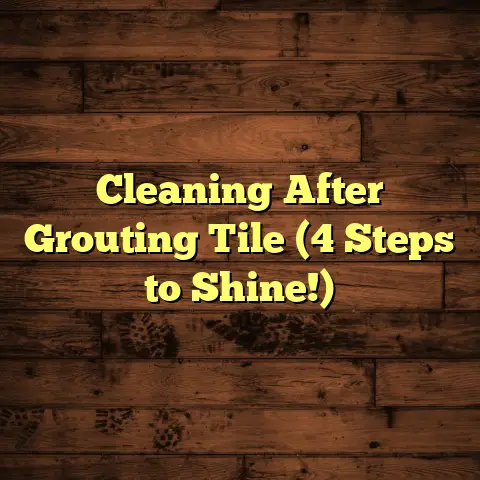Engineered Vs Solid Hardwood Flooring Cost (Explained)
When it comes to hardwood flooring, choosing between engineered and solid hardwood can be a daunting task. The decision involves various factors, particularly cost. This article will provide a comprehensive overview of the costs associated with both types of flooring, as well as insights into installation, maintenance, and decision-making criteria.
Overview of Major Cost Factors
Before diving into specifics, it’s essential to understand the major cost factors influencing hardwood flooring installation:
1. Area Size
The larger the area you wish to cover, the more materials and labour will be required. Costs are generally calculated by square footage (sq. ft.).
2. Type of Hardwood
Different wood species come at varying price points. For example, oak may be less expensive than walnut or cherry.
3. Labour Costs
Professional installation can significantly impact your overall budget. Labour costs differ by region and the complexity of the installation.
4. Additional Considerations
- Floor Removal: Removing existing flooring can add to costs.
- Subfloor Replacement: If the subfloor is damaged, it may need replacing, which will incur additional expenses.
- Material Grade: Higher grade materials often come with a premium price.
- Room Size/Layout: Unusual room shapes may require more precise cutting and fitting.
- Installation Type: Methods such as nail-down, glue-down, or floating will affect the overall costs.
Cost Breakdown
Solid Hardwood Flooring
- Material Costs:
- Oak: $3-$8 per sq. ft.
- Maple: $5-$10 per sq. ft.
- Cherry: $6-$12 per sq. ft.
- Walnut: $8-$15 per sq. ft.
- Installation Costs:
- Professional installation: $3-$8 per sq. ft.
- DIY installation can save on labour costs but requires tools and skills.
- Total Estimated Cost:
- For a 100 sq. ft. room using oak:
- Material: $300-$800
- Installation: $300-$800
- Total: $600-$1,600
- For a 100 sq. ft. room using oak:
Engineered Hardwood Flooring
- Material Costs:
- Oak: $2-$6 per sq. ft.
- Maple: $3-$7 per sq. ft.
- Cherry: $4-$9 per sq. ft.
- Walnut: $5-$12 per sq. ft.
- Installation Costs:
- Professional installation: $2-$5 per sq. ft.
- DIY installation options are available but require some expertise.
- Total Estimated Cost:
- For a 100 sq. ft. room using oak:
- Material: $200-$600
- Installation: $200-$500
- Total: $400-$1,100
- For a 100 sq. ft. room using oak:
Comparison with Alternative Flooring Options
To provide context, here’s how hardwood compares with other popular flooring options:
| Flooring Type | Material Cost (per sq. ft.) | Installation Cost (per sq. ft.) | Total Cost (100 sq. ft.) |
|---|---|---|---|
| Solid Hardwood | $3-$15 | $3-$8 | $600-$1,600 |
| Engineered Hardwood | $2-$12 | $2-$5 | $400-$1,100 |
| Laminate | $1-$5 | $1-$3 | $200-$800 |
| Vinyl | $1-$8 | $1-$3 | $200-$1,100 |
| Carpet | $2-$5 | $1-$3 | $300-$800 |
Signs That Hardwood Floors Need Replacement
Recognizing when your hardwood floors need replacement is crucial for maintaining your home’s value and aesthetic appeal. Here are signs to look out for:
- Deep Scratches and Gouges: Excessive damage may necessitate replacement instead of refinishing.
- Water Damage: Prolonged exposure to moisture can warp and damage hardwood.
- Cupping or Crowning: Distortion in shape indicates structural issues that might require replacement.
- Inconsistent Colouration: Fading or discolouration may not be salvageable through refinishing.
Refinishing vs. Replacing
When considering whether to refinish or replace your hardwood floors, contemplate the following:
- Condition of the Wood: If there’s significant damage like deep gouges or rot, replacement might be the best option.
- Cost Efficiency: Refinishing is generally cheaper than replacing; however, if multiple refinishes have occurred, replacement may be necessary.
- Aesthetic Preferences: If you’re looking to change the style or colour dramatically, replacement may be the better route.
Pros and Cons of Hardwood Flooring
Pros
- Durability: With proper care, hardwood floors can last for decades.
- Aesthetic Appeal: The natural beauty of wood adds warmth and character to any space.
- Increased Home Value: Hardwood is often viewed as a premium flooring option that can enhance property value.
Cons
- Cost: Initial installation can be expensive compared to alternatives like laminate or vinyl.
- Maintenance: Requires regular maintenance to keep looking its best, including refinishing every few years.
- Susceptibility to Moisture: Not ideal for areas prone to water exposure like basements or bathrooms without proper sealing.
Professional Installation vs. DIY
Professional Installation
- Cost: Hiring professionals typically costs more but ensures higher quality and durability.
- Skills Required: Professionals have the necessary tools and experience to handle complexities in installation.
DIY Installation
- Cost Savings: While you save on labour costs, you must invest in tools and materials.
- Skills Required: Requires a degree of skill; improper installation can lead to complications down the line.
Questions to Ask Hardwood Flooring Contractors
When hiring a contractor for your flooring project, consider asking the following questions:
- What types of hardwood do you recommend for my project?
- Can you provide references from previous clients?
- What is included in your installation quote?
- How long will the installation take?
- Are you insured and licensed?
- What is your policy on warranties or guarantees?
Hardwood Floor Care and Maintenance Tips
To prolong the life of your hardwood floors and keep them looking new:
- Regular Cleaning: Sweep or vacuum regularly to remove dirt and debris that can scratch the surface.
- Use Proper Cleaning Products: Avoid harsh chemicals; use pH-neutral cleaners specifically designed for hardwood.
- Humidity Control: Maintain indoor humidity levels between 30% and 50% to prevent warping or cracking.
- Protective Pads: Place pads under furniture legs to prevent scratches and dents.
- Area Rugs: Use area rugs in high traffic areas to protect against wear.
In conclusion, understanding the costs associated with both engineered and solid hardwood flooring is essential for making informed choices in your flooring projects. By assessing area size, wood type, installation methods, and potential alternatives, you can create a beautiful foundation for your home that meets your aesthetic and budgetary needs while ensuring longevity through proper maintenance practices.





